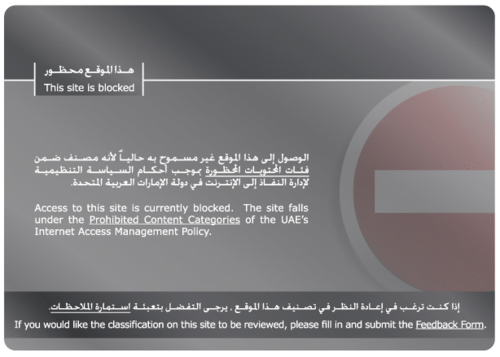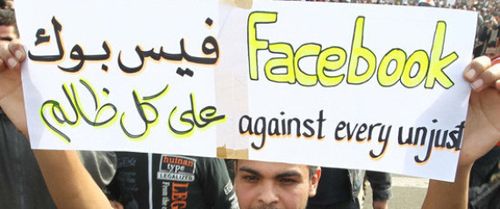
As mentioned, am in Abu Dhabi this week and will write more about the conference content during the course of the week but, today, am struggling a little bit as my blog is banned here.
It’s the first country I’ve been to in my travels – and I’ve travelled lots – where I cannot actually see my blog’s website.
All I get is this screen …

… at first, I thought it was the wifi internet connections but, having tried three or four PC’s on different wifi networks, realised it must be the website.
So I reported the website down to my tech support, but the UK has a national bank holiday on Monday.
Then I realise I get the same screen when I try to access a few other websites and start getting suspicious. At this point, like most, I begin Googling and find that the UAE are masters at trying to control the internet.
This is to try to block gambling and pornography websites and I guess anything classified as ‘a blog’ that could be subversive, even when it’s a business blog.
So it’s a bit strange standing up to give my keynote and telling the audience: “everyone can find out more background at my blog, the Finanser, except for those of you from here”.
It would also have been more useful if the blog website was on the official banned list, as those links result in an official instruction …

… rather than just hanging as though my wifi has gone down.
And it’s strange how many websites are banned here. For example, Skype is not allowed because the local telco doesn’t want to lose its’ fee income. How strange as other websites such as youtube, which many report is banned on the net, is not.
In fact, there are many websites that are allowed to be accessed here, even though the webbies say they are outlawed.
For example, Facebook and Twitter are fine; Tumblr’s OK (and that’s a blogging website); and, as you can see, I can still blog but that’s because I use Typepad for blog content creation and that’s allowed. It’s just the Finanser, classified as ‘a blog’ that’s banned.
So I can write subversion and share news, but just can’t read it.
This is a very strange and conflicted policy in this country of open borders with tight controls.
And even with all these tight internet controls, I could read my blog’s website and use Skype if I wanted to, as you only have to Google to find sponsored ads that will hide your IP address from the spying authorities and give you access to all.


In other words, for all the efforts to control the internet the UAE authorities, and most others, have no control.
This is the same challenge that the US authorities had with Wikileaks, who kept moving their IP addresses, servers and mirrored systems around the world. It’s the same issue the UK authorities have with superinjunctions.
And all of this has smouldered together to lead to the e-G8 summit where world leaders from the largest nations discussed how to handle regulation of the internet.
If you’re into world leaders and their views, here’s the opening keynote from the summit …
And if you click here, you can watch the other plenary sessions too.
For now, I’m writing this blog entry in my vacuum of UAE, and thinking that this is a Wild West when the government has banned access on the one hand, but I can just skirt around such bans for $14.95 a month.
Don't get me wrong though.
Government’s will eventually come up with a policy for this Wild West.
A little bit like old media evolution to new media, old government is becoming new government and it will eventually find ways to deliver global agreements and compromises on what is and what is not allowed.
There will be those who disagree and it will leave cracks in the armour of the internet policies, but only the true seekers of such information will try to find it.
And that leads to a final point, almost unrelated.
I stumbled upon some fascinating research yesterday, here in the UAE.
A new book has just been released, analysing all of the pornography on the internet and how it is found and used.
What has that got to do with government controls?
Well, it relates to my last point: those who really want it will find it.
This is a point made by researchers Ogi Ogas and Sai Gaddam: “truly violent pornography is extremely rare. It truly is rare and the kind of people who watch it are a clearly identifiable group.”
This is all about our behavioural changes, as society transitions from old world to new world and from disconnected to all connected.
It is the point I’m making every day as I go around conferences discussing the mobile internet and how it is transforming banking, a point I’ll return to as I’ve purposefully avoided mentioned banks in this blog entry.
This blog entry is to tell government regulators that their aim should not be to ban access to information erroneously, as the UAE’s policy illustrates, but to monitor internet usage to seek those who are the kind of people they are trying to stop, most of whom are clearly identifiable groups.
Whether we support or resist how a government targets which groups is a completely separate matter, but just banning the internet for the internet’s sake will just cause civil unrest.
Oh, now where did I get that idea from?

Postnote: this post was written in the UAE on an allowed website and published on one that is disallowed.
Chris M Skinner
Chris Skinner is best known as an independent commentator on the financial markets through his blog, TheFinanser.com, as author of the bestselling book Digital Bank, and Chair of the European networking forum the Financial Services Club. He has been voted one of the most influential people in banking by The Financial Brand (as well as one of the best blogs), a FinTech Titan (Next Bank), one of the Fintech Leaders you need to follow (City AM, Deluxe and Jax Finance), as well as one of the Top 40 most influential people in financial technology by the Wall Street Journal's Financial News. To learn more click here...

